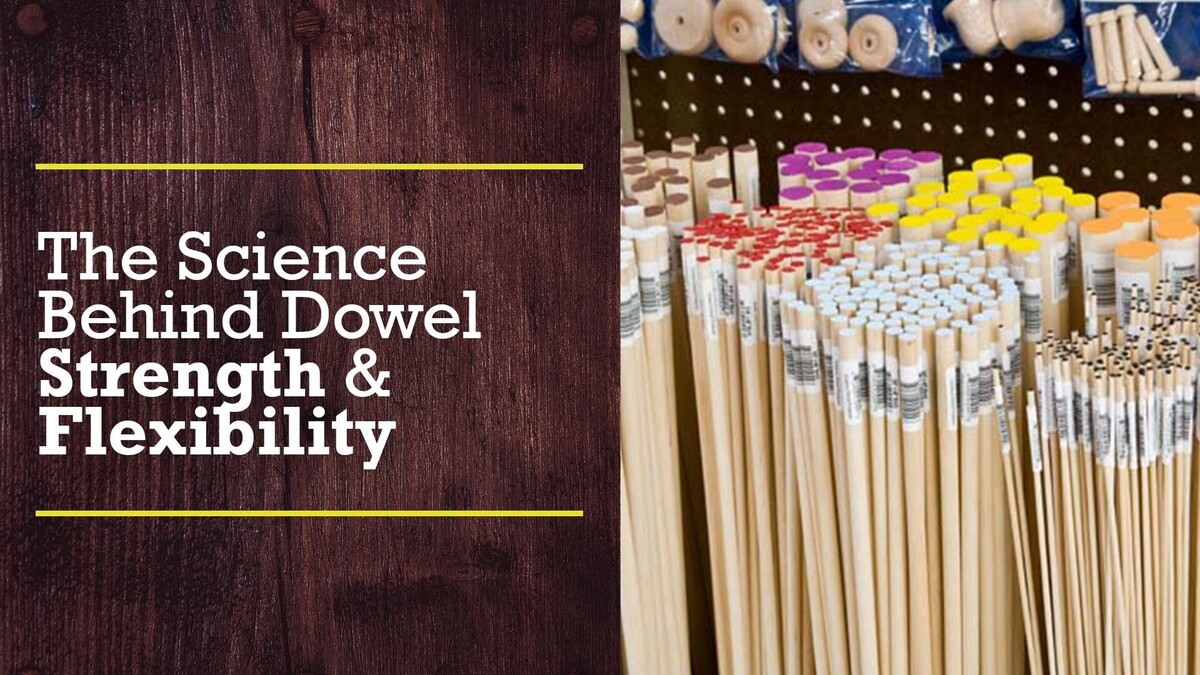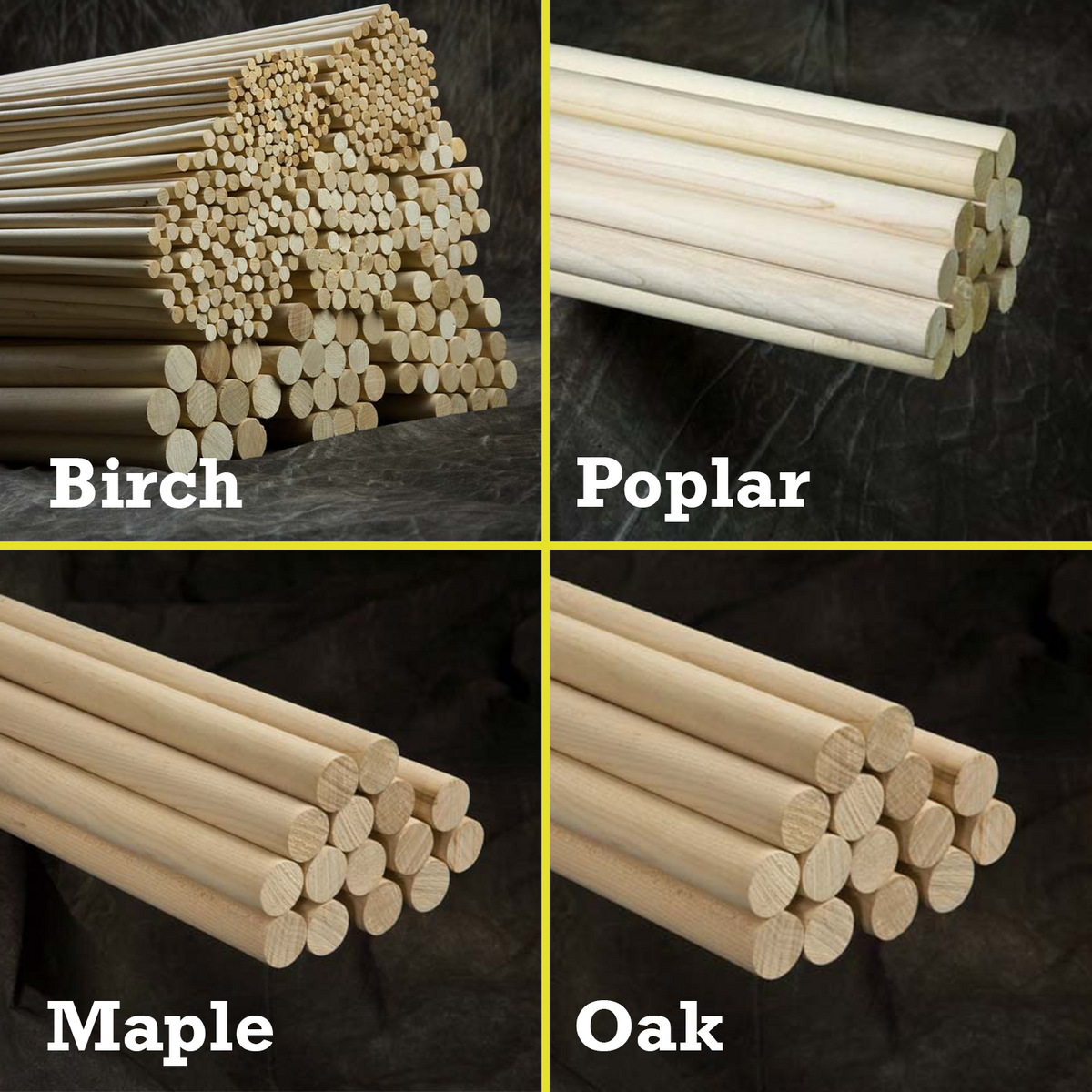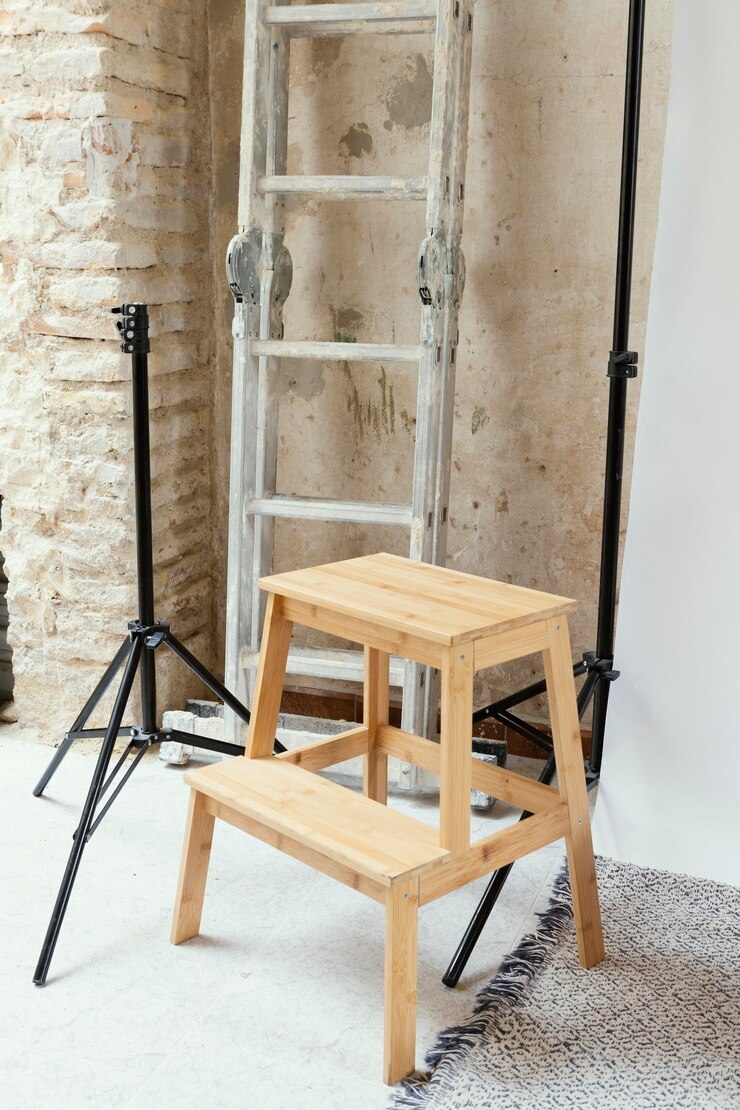The Science Behind Dowel Strength & Flexibility

Wood dowels are simple yet essential components in woodworking and construction, offering a versatile solution for joining wood, reinforcing structures, and adding decorative elements.
At Cincinnati Dowel & Wood Products, we offer a wide range of high-quality wood dowels crafted from various wood species, each offering distinct characteristics in terms of strength, flexibility, and workability. Understanding the science behind these properties can help you choose the right dowel for your specific project.
In this post, we will explore the factors that influence the strength and flexibility of wood dowels, and why certain species, such as oak, birch, maple, and poplar, perform differently in various applications.
What Influences the Strength of Wood Dowels?
The strength of a wood dowel is determined by several key factors, including the wood species, grain orientation, moisture content, and density. These elements combine to define how much load a dowel can bear and how well it can withstand forces without breaking.

Wood Species
Different wood species have varying densities and fiber structures, which directly affect the dowel’s strength. Some woods, like oak and maple, are known for their exceptional hardness and strength, making them ideal for projects that require heavy-duty support. On the other hand, softer woods like poplar and pine offer greater flexibility and are easier to work with, but they may not provide the same level of strength as harder species.
At Cincinnati Dowel, we offer dowels made from species like:
- Oak: Known for its toughness, oak is a hardwood with high density, making oak dowels suitable for structural applications, furniture, and joinery that require long-lasting durability. The tight grain pattern of oak also enhances its strength.
- Maple: Maple dowels are another excellent choice for high-stress applications. Maple is a dense hardwood, renowned for its resistance to wear and tear. Its fine grain and smooth texture also make it a popular choice for precise woodworking projects.
- Birch: Birch dowels provide a balance between strength and workability. Birch is a moderately hard wood with a close grain structure, offering good strength while still being easy to work with in terms of cutting and sanding.
- Poplar: Poplar dowels, while softer than oak or maple, are still widely used in woodworking. Their lighter weight and greater flexibility make them ideal for less load-bearing applications or for use in projects where ease of shaping and crafting is required.
Density and Grain Orientation
The density of the wood refers to how tightly packed the wood fibers are. Hardwoods like oak and maple are denser, which typically makes them stronger and more resistant to bending or breaking under pressure.
The grain orientation, or the direction in which the wood fibers run, also plays a critical role in dowel strength. A dowel with straight grain running parallel to its length will be stronger because it aligns with the natural strength of the wood fibers, making it less prone to splitting.
In contrast, dowels with a more irregular or cross-grain structure can be weaker, especially when subjected to lateral forces. Cincinnati Dowel ensures that our dowels are manufactured with the optimal grain alignment to maximize strength and durability for various applications.
Moisture Content
Moisture content affects both the strength and flexibility of wood dowels. Wood is a hygroscopic material, meaning it absorbs and releases moisture depending on the environment. When wood absorbs too much moisture, it can become weaker and prone to swelling. Conversely, if it becomes too dry, it can become brittle and more likely to crack under pressure.
At Cincinnati Dowel, our dowels are kiln-dried to a specific moisture content, ensuring that they are neither too wet nor too dry. This careful drying process helps to maximize the dowel’s strength and flexibility, making them suitable for a wide range of indoor and outdoor applications.
Understanding Dowel Flexibility
Flexibility is another important characteristic to consider when selecting a wood dowel. Flexibility refers to a dowel's ability to bend without breaking. This property is crucial in certain applications where the dowel needs to withstand movement or pressure without snapping. As with strength, flexibility is largely influenced by the species of wood, grain structure, and moisture content.
Wood Species and Flexibility
Softer woods like poplar and pine are more flexible than denser hardwoods. These dowels can bend under load, which is advantageous in applications where some give is needed, such as in flexible furniture joints or where movement is anticipated. However, this flexibility comes at the expense of strength, so softer woods are less ideal for applications that require structural support.
Poplar dowels are prized for their flexibility. This makes them useful in projects that require curved designs or where the dowel must be inserted into tight spaces.
On the other hand, oak and maple dowels are less flexible due to their dense, tight grain structures. While this makes them more resistant to bending and breaking, it also means they are less suitable for applications that require flexibility. However, these denser species are ideal for furniture making, shelving, and cabinetry, where rigidity and strength are essential.
Balancing Strength and Flexibility
The key to choosing the right dowel for your project lies in finding the right balance between strength and flexibility. For example, in projects where load bearing is a priority, a dense hardwood dowel like oak or maple would be preferable. However, if the dowel needs to accommodate movement or fit into a curved design, a more flexible wood like poplar might be a better choice.
When using dowels for joints in furniture, such as in chair frames or table legs, the strength of a hardwood like maple or oak is often necessary. In decorative projects or craft applications, where the dowel does not need to bear significant weight, the flexibility of poplar can offer ease of use and adaptability.

Applications of Different Wood Dowels
Different types of wood dowels excel in various applications based on their specific properties.
- Furniture Making: Oak and maple dowels are ideal for furniture joinery, offering strength and durability in high-stress joints like chairs, tables, and shelving units.
- Crafts and Decorative Uses: Poplar dowels are perfect for crafting and decorative purposes, where ease of shaping, painting, and flexibility are more important than structural integrity.
- Construction and Structural Uses: Birch dowels are commonly used in construction for structural support, as they provide a good balance of strength and workability.
- Cabinetry and Fine Woodworking: Maple and birch dowels are often used in cabinetry and fine woodworking due to their smooth finish, fine grain, and ability to take on finishes evenly
Trust Cincinnati Dowel for Reliable and Versatile Wood Dowels
The science behind dowel strength and flexibility reveals the intricate balance of factors such as wood species, grain orientation, density, and moisture content.
At Cincinnati Dowel & Wood Products, we offer a variety of dowels made from high-quality species like oak, maple, birch, and poplar to meet the specific needs of your project. Whether you require strength for heavy-duty applications or flexibility for intricate designs, our wood dowels provide reliable and versatile solutions.
Understanding the properties of different wood species allows you to make informed choices that ensure the success of your woodworking projects, whether you’re building furniture, crafting decorative items, or undertaking structural tasks.
Explore our wide range of dowels to find the perfect fit for your next project click here!
Happy with the difference Cincinnati Wood products have made for your operations? Leave us a five-star review on Google here!
Want more tips and info on wooden dowels? Follow us on Facebook, Instagram, and LinkedIn!


